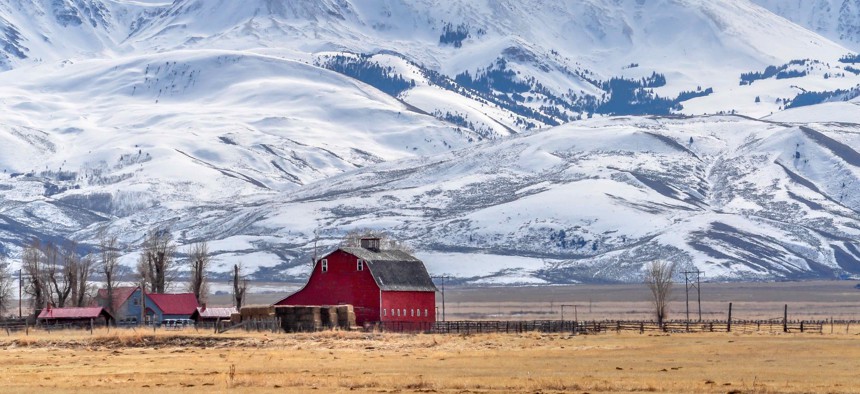Rural Public Health Staff Strained by Covid Surge, Public Backlash

Shutterstock
STATE AND LOCAL ROUNDUP | Two Minnesota state senators switch from Democratic caucus to independents, citing polarization … Plans for historic dam removal moving ahead … Matthew McConaughey for Texas governor?
The Covid-19 pandemic is placing heavy burdens on staff working in health departments and hospitals in rural parts of the country, as more and more people catch the illness and as backlash mounts against government restrictions to stop its spread. Trish Fievet, an administrative assistant who puts in over 55 hours a week at Montana’s Park County Health Department described a daily onslaught of calls, many from people mad about things like the unavailability of tests, delayed test results, or public health restrictions. “It’s just angry people every day. I think it’s just anxiety and they are scared,” she said. “I get it, I really do get it.” But she adds: “It’s mentally exhausting.” Earlier this month, the four-member staff of the county health department in Pondera County resigned, pointing to what they characterized as a lack of support from the county in combating the coronavirus. An outgoing nurse said the department has received almost non-stop harassment since then. “I don’t think any public health nurse or director thought when this happened that we would have the pushback that we’ve had,” said Sue Ann Good, the public health nurse for McCone County, Montana.
Minidoka Memorial Hospital, in Rupert, Idaho, with 17 beds, has been grappling with an influx of Covid patients in recent weeks. On a recent morning, seven staff tested positive for the disease, leaving 19 staff out sick one day. “We’ve had a lot of higher acuity patients, and they’ve been just really, really sick,” said nurse Kaylee Tracy. “And so it’s trying to keep the families informed, trying to keep the doctors informed, the patients well, and along with the staff ... We’ve been working overtime, working really hard. It does get stressful on the staff as well.” Tom Murphy, CEO of the hospital, like health officials in other communities and states, warned that Minidoka Memorial and other facilities could eventually run up against their limits handling Covid cases. “I see us reaching a point where there is not enough capacity because we have this huge backlash against mandates … of doing some of these things that could help,” he said. “We have an unwillingness of any officials anywhere, whether state or regional to really adopt mask mandates. And we’re such a mobile community...so it has to be a regional or statewide effort.” [Billings Gazette, Idaho Statesman]
CAUCUS SPLIT | Two state senators from Minnesota’s Iron Range region said Wednesday they would break ranks with the state’s Democratic party and form an independent caucus in the closely divided state Senate chamber. Sens. Tom Bakk and David Tomassoni noted increasing political polarization as a main factor behind their move. "People are going to wonder why I'm doing this — and to be honest, there are several reasons. I'm very disappointed by the extreme partisanship going on nationally and right here in Minnesota," Bakk said. "Both political parties are to blame. The constant negative and sharp rhetoric is undermining voters' confidence in our public institutions. It doesn't have to stay this way." Republicans held a 34-33 majority in the state Senate. The change means Democrats will slip to 31 seats. [Star Tribune, MPR News]
DAM REMOVAL | Plans are moving ahead for what would be the largest dam removal project in the nation’s history on the lower Klamath River, in Northern California and Southern Oregon. The project would involve demolishing four aging dams that are not generating large profits. If completed, it would open up hundreds of miles of river, providing habitat for struggling salmon populations. Federal regulators will still need to grant approval. [Associated Press, OPB]
SLUDGE | A water and sewer authority in Pittsburgh, Pennsylvania for seven years dumped chemical-infused “sludge” into the Allegheny River, in violation of the Clean Water Act, U.S. Attorney Scott Brady said Wednesday. The authority has pleaded guilty to eight federal charges related to the dumping allegations. The sludge would sometimes build up in the river, according to Brady. “Birds were observed walking on these islands of sludge,” he said. [TribLIVE.com]
BORROWING | New Jersey is in the final stages of getting ready to borrow upwards of $4 billion to help shore up the state budget as the coronavirus pandemic drags on. Investors showed a high level of interest in the tax-exempt bond sale and interest costs were expected to be just under 2%, according to state Treasurer Elizabeth Maher Muoio. [NJ Spotlight News]
MCCONAUGHEY FOR GOVERNOR? | Actor Matthew McConaughey left open the possibility he might be interested in running for governor of Texas. “I don’t know,” McConaughey told talk radio host Hugh Hewitt. “I mean, that wouldn’t be up to me. It would be up to the people more than it would me.” Republican Gov. Greg Abbott is up for re-election in 2022. McConaughey didn’t say if he is a Democrat or Republican. He also didn’t seem to be overly eager for the job. “You know, I still question how much you can really get done in politics, and I don’t know if politics is my avenue to get what maybe I am best equipped to get done,” he said. [Houston Chronicle, The Hugh Hewitt Show]
Bill Lucia is a senior reporter for Route Fifty and is based in Olympia, Washington.
NEXT STORY: State and Local Officials Want to See Climate Policy Support—and Funding—Under Biden Administration






